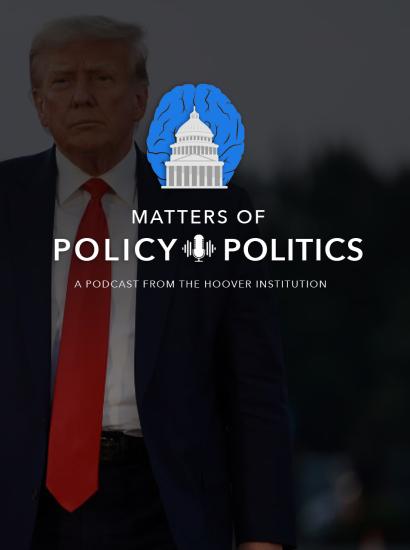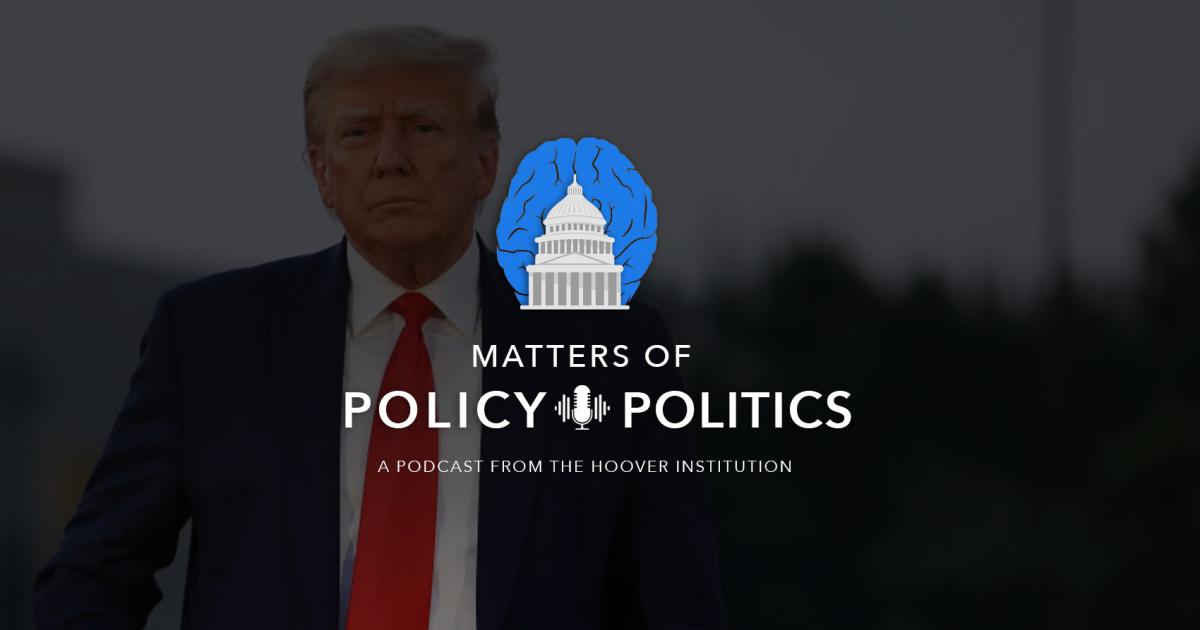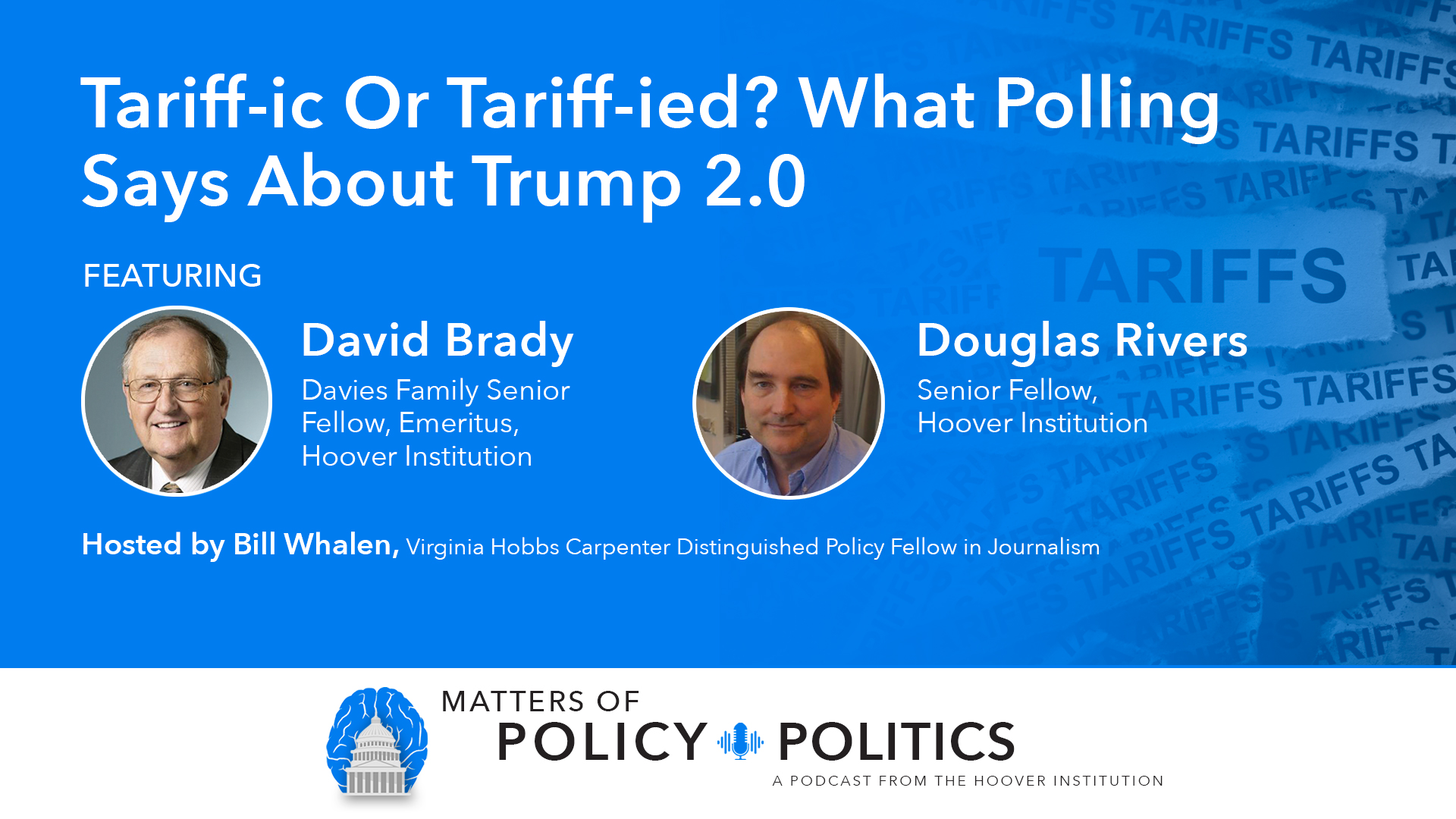- Politics, Institutions, and Public Opinion
- Revitalizing American Institutions
- Understanding Public Opinion
Donald Trump’s first 100 days since returning to office have been prolific – the most executive orders issued in the early days of a presidency – and seemingly in a constant state of political turbulence.
What do the polls indicate about Trump’s performance to date? David Brady and Douglas Rivers, Hoover Institution senior fellows, and Stanford University political scientists, discuss how various policy choices – tariffs, immigration enforcement, legal imbroglios – have affected Trump’s approval, plus where a struggling Democrat Party stands as both parties ponder a midterm election still 550 days ahead.
Recorded on April 30, 2025.
WATCH TO THE EPISODE
>> Bill Whalen: It's Wednesday, April 30, 2025. And welcome back to Matters of Policy and Politics, a Hoover Institution podcast devoted to governance and balance of power here in America and around the world. I'm Bill Whalen. I'm the Virginia Hobbs Carpenter Distinguished Policy Fellow in Journalism here at the Hoover Institution.
I'm not the only fellow who's podcasting these days. I suggest you go to our website, which is hoover.org podcast and see who all is talking ideas these days. We do great podcasts. We just cover the waterfront and policy. It's good. So today we're gonna talk about the Trump presidency, where it stands now that it's past the magical Mythical 100 100-day mark, which for those of you not familiar with American politics, is catnip for punditry in terms of assessing how a presidency is going.
I will begin this podcast by saying that this is an unusual presidency in several regards. First of all, it's the first time since the 1890s that America has had a president in a second but non-consecutive term. You have to go back to Grover Cleveland in the 1890s for that.
It's a presidency that hit the ground running in unusual ways. Donald Trump having having signed 140 plus executive orders in his first 100 days that easily topped the old record which was Franklin Roosevelt back in 1933. He signed 99. It's also a presidency that is unusually turbulent by compared to other non Trump presidencies.
I should qualify. To me, gentlemen, it's proof of Newton's third law of motion. What did Newton write? Quote, for every action there is an equal and opposite reaction. I say that because while Trump has done over 140 executive orders, those executive orders have prompted over 217 lawsuits to date.
One other unusual aspect of the Trump presidency, he has signed just five bills into law since coming into office. That's a new record, a new low. George W Bush held the previous record with only seven signed in 2001. So Trump having signed five is the new standard for that.
So what to make for all of this, I turn to two of the smartest people I know when it comes to matters of politics and public opinion, and that's my Hoover colleagues, David Brady and Doug Rivers. Dave Brady is the Hoover Institution's Davies family Senior Fellow Emeritus and the Bowen H and Janice Arthur McCoy professor of Political Science at Stanford's Graduate School of Business.
Doug Rivers is a Hoover Senior Fellow and a Stanford University Political scientist. He's also the Chief Scientist at YUGA plc, a global polling firm, which means that Doug is out there in the trenches and the weeds and the great beyond at all times, trying to assess what the public thinks of this presidency.
Gentlemen, thanks so much for coming on the podcast. Seems like we just had an election a few days ago.
>> Douglas Rivers: Seems like forever ago to me.
>> Bill Whalen: So let's begin. Doug, I want to turn to you. I spent some time going through YouGov's website and you do an excellent job at archives, by the way congratulations.
It's relatively idiot proof. An idiot like me. And let me throw some polling data at you, Doug. I looked up Trump in 2017 when he came to office. This is the Trump 10 presidency on January 30, 2017. And Doug, I picked that date because you had numbers for him on January 20.
But I thought it best maybe to see if there's any movement between the 20th and the 30th, given his rather startling American Carnage inaugural address that maybe you remember or not. So on January 30, 2017, Doug, I have Donald Trump with a 45.5% approval rating. You move forward to May 1, which is about the 100 day mark of that presidency.
He's at 43.6%. So it's about a 2 point percent drop. A curious thing, by the way, and I recommend people go to YouGov's website and look at this as well. It's fascinating, Doug, how Trump's numbers are relatively consistent through four years in office. It's just almost like a straight line look.
40s approval and low 50s disapproval. It never shoots up one way or the other that much. Now let's turn to Trump 2o, Doug. January 27th of this year, Donald Trump's approval rating is 50%. His disapproval is at 45 8%. Trump on March 31st, the same numbers, pretty much 50% approval, Doug, 45.8% disapproval.
Then we have Liberation Day, Wednesday, April 2nd. And now we have him past 100 day marks. So I turn to you, Doug, tell us where Donald Trump stands chance right now.
>> Douglas Rivers: So last week we reported that Trump's popularity approval rating had dropped to 41%. And in the poll releasing today, it's at 42%, which is well within normal statistical variation.
So this is the biggest move down for Trump, basically a close to 10 point move in the last month that we've seen since he came down the escalator in 2016. So this is a significant change. The way I look at it is Trump started his second administration much Higher than he was at the time of his first administration.
The same way that his vote was almost 50%, 49.8%, right. So Trump did start from a higher point this way around. But I think what we've seen is that Trump acted like he won a 55 or 60% margin and the degree of overreach is catching up with him.
The first month or two of the administration, the level of activity appealed to his base and independents thought we're getting a strong act of president, which is quite a contrast from Biden. But over the last month, we've descended into what most people think is a chaotic world with two-thirds of the voters saying the country is out of control at this point, including nearly half of Republicans.
>> Bill Whalen: So the question to you and Dave is what caused the 10 point drop off? Is it something.
>> David Brady: I've been told.
>> Bill Whalen: Something specific he did? That's why I mentioned Liberation Day and the tariffs. Is it a combination of repeated things he did? They're all executive orders.
And how much of this is policy versus how much is driven by personality?
>> David Brady: I'm gonna go a little bit in the first part of the policy. I've been tracking not just Trump's approval rating, overall approval, but by issues. And I thought the most important issue, the one I thought that helped him the most in the 2024 election, was inflation.
On the approval rating, he's down, as Doug points out, he's down low. But most of the action is among independents on the overall job approval. So Democrats didn't like him to start with. Republicans did a little fall off there, but the big falloff is among independents. On inflation, however, that's the one place where on inflation Republicans have, there's about a 10-point drop on Republicans saying that he's doing a good job on that.
But among independent, it's been very strange. And the gap, there's in general a gap between if you're a maga, Republican, Doug has us asked in the surveys whether you're a maga, meaning are you a strong Trump supporter. And the MAGA supporters, 65% of them, as opposed to 40% of regular Republicans, think that the economy is getting stronger, not worse.
They approve of the tariffs, they approve of inflation. It's the Republicans who don't answer the question. They're maga. They're the ones that support us fallen off more. But still he's the base of the part the party overall, it's about 85% still approve of the job he's doing.
>> Douglas Rivers: Yeah, so in the 2024 election, inflation was clearly the most important issue, and it still is.
If you ask people what's the most important issue, 79% say inflation was very important, and 96% say it was very important or Somewhat important, which is higher than any other issue. This is the issue that killed the Biden administration, that Biden never recovered from the inflation in 20, 22 and 23.
Trump had a huge advantage on inflation at the time of the election. Basically close to plus 20 points on that issue. Right now, 57% of the public disapproves of the way he's handling inflation. They elected him to come in and reduce prices, get a good economy. And the tariff policy, you know, threatens clear increase in prices that people will pay.
And it's very unpopular so far. We haven't actually seen an increase in prices. This is something that's on the horizon. So this threatens the entire second Trump administration. If they don't get this under control, they're in deep trouble and it's not going to work to do essentially what Biden did, which is say it's, it's not so bad.
Who are you going to believe, me or your lying eyes?
>> Bill Whalen: Now, is it strictly economics to blame here? Majority economics. What role does foreign policy play into this, Doug? Cuz he did promise coming to office saying he would end the Ukraine war on the first day or.
>> Douglas Rivers: Well, he now says that was in jest. I think the foreign policy side is something that is, has a much weaker effect with the public at large. His Ukraine policy is not terribly popular, but it's on the order of, of I think six or seven points negative, not 20 points.
And people weren't voting in the 2024 election on foreign policy. It was much more inflation. And a close second was immigration. Immigration is the issue in which they're minus six, I believe, this week on immigration, which is an issue that, again, was up 20-
>> Bill Whalen: It's down six points on immigration?
>> David Brady: Yes, that's a yes.
>> Bill Whalen: Okay.
>> David Brady: I do want to say on that foreign policy that I agree with everything Doug said, but I do think that in terms of policy, the long term consequences of the foreign policy are perhaps more important because the question of what do our allies, what a Canada, what a Mexico, what are the European Union, what a NATO, to what extent are they, to what extent can they in the long haul trust the United States commitments?
I think that's, that's going to be a more and more important question over time.
>> Douglas Rivers: Yeah, I mean, we're political hacks here and obviously what happens in foreign policy is incredibly consequential to Americans, but it's not top of mind to voters at the moment. I'd like to correct one thing.
He's minus one in inflation, not minus six.
>> Bill Whalen: Minus one, okay, I wanna go back to immigration for a second, because this would seem to be an area where he could take a victory lap in this regard. If you look at the border right now, he has brought the border under control, as promised.
But, gentlemen, is the problem that what he's done on the border overshadowed by the drama of the gentleman down in El Salvador and the lawsuits going on right now? I think I mentioned 217 lawsuits. I think 60 of those lawsuits related to immigration policy. So is it a case of him doing too much on immigration, perhaps not focusing the public on the one you.
>> David Brady: Think back to the first term people were for him on immigration, but then when they split the families, it makes a difference how you do it.
>> Bill Whalen: Right.
>> David Brady: And so I think what's hurt him on immigration is the pictures of hurting people in the lawsuits bring up the point that even if you want them deported, they do have some rights before they're deported.
And the guy in El Salvador that's been put there illegally, Trump today said he wasn't gonna bring him out. So I think it's more the style that's affecting the immigration issue.
>> Douglas Rivers: The public supports restrictions on immigration, deporting people who are here illegally, especially if they're convicted of crimes.
I think what they're getting at the moment is more than they bargained for. You know, so put ICE people on the streets, taking away people who aren't violent criminals, sending someone mistakenly to maximum security prison in El Salvador, talking about doing the same to American citizens. That is overreach.
If Trump showed restraint on this, I think his position on immigration would be pretty strong. But I don't really think that's in his wheelhouse.
>> Bill Whalen: So he has given the Democrats ample talking points when it comes to immigration and ample talking points in general about management of the presidency.
But gentlemen, from just a data standpoint, from what you're looking at polling, where is the Democratic Party right now? Are they gaining it all from Trump?
>> Douglas Rivers: No, they're not gaining at all. In fact, the Democratic Party is less popular than the Republican Party at the moment. So in our latest poll, we have Democrats at 36% favorable rating and 55% unfavorable, whereas Republicans are 40% favorable and I think 52% unfavorable.
The problem for the out party is they don't have one person speaking for them. And the people they do have speaking for them, like Chuck Schumer, are not that effective communicators. I think it remains to be seen how the more leftist firebrands like Bernie Sanders and aoc, who are more effective communicators but are too far left for large fractions of the American public.
So it's the usual problem of an out party. But so far, if the Democrats are counting on Trump's unpopularity to save them, I don't think it's going to work in the short run.
>> David Brady: Happened in 2018. It wasn't that the Democrats suddenly got more popular. It was they didn't like what Trump was doing.
And Covid, I think the Democrats don't need to be liked to win the House of representatives in 2026. I don't think they're going to win the Senate, but. But that's always the out party, as Doug says. But I don't think they need to be popular to win. They're the alternative.
>> Bill Whalen: This is an interesting strategic question we should talk about and tied into your poll. So you have competing schools of thought within Democratic circles. There is the James Carville school of thinking, which is kind of Napoleonic. Don't get in the way of the enemy when the enemy is destroying himself.
In other words, lay low and voters will punish the Republicans in the midterms in 2026. Conversely, you have someone like Illinois Governor J.B. pritzker going to New Hampshire last weekend and saying, we've got to go in the streets, literally, and take into the streets and march and fight back.
So an activist approach. But Doug, is there anything within the data that you have in front of you that suggests that there's one way or other that Democrats are leading? Are they happy being passive or do they want a fighter?
>> Douglas Rivers: Well, the Democratic base is relatively unhappy.
So the low ratings that the Democrats are getting on favorability are due primarily to Democrats not being as favorable towards the Democratic Party as Republicans are towards the Republican Party. I think there's a balance between being passive, which the base doesn't like, and in fact, voters want someone that says they're going to fix things and taking unpopular fringe positions on issues.
So the challenge for Democrats is the 2024 election showed a shrinking of the Democratic base. And so they need to appeal to the voters they've been losing, some of whom are minorities, some of whom are, you know, younger white males, and large number of which are not left wingers.
>> David Brady: I agree with that. And looking at this issue over time, the problem for the Democrats has been they win elections, when they win the moderate vote. And the Democratic Party has some advantage on that because they're a little more heterogeneous in the sense that if you look at Democrats, about 60 to 65% are liberal or very liberal, but 30, 35% are.
They say, they're a moderate to conservative. And most independents who swing elections are moderates. So I agree with Doug, you've got to appeal that base. But that is not. When you lose, as the Democrats did in 2024, that's the sign on the left. The view is, why did we lose?
We lost because we weren't liberal enough, we weren't progressive enough. If we just get more progressive, that's aoc, that's Bernie. My view is that's a dead sure loser. I just went back and looked at elections from Obama. I mean, sorry, from 2004 through the election. And the moderate Democrats, when Democrats win moderates, they win elections.
When they don't win moderates, they lose elections. And pretty much the same is true for Republicans. But anyway, that's the issue. My view is the action's in the middle. You can get to the middle, you can win.
>> Bill Whalen: So if you're a Democratic strategist, you could look at 2026 in two ways and probably shame on us.
We're talking about 2026. It's what, 550 days away? But why not? You could either just say, okay, it's a pure anti-Trump campaign, just make it against Trump, or you could try another line or maybe add the line of attack, which is it's a do nothing Republican Congress. I mentioned that Trump has tried only five bills so far in the law.
But, Doug, if you go down the do nothing, that begs the question of what it is that the public wants done right now.
>> Douglas Rivers: Yeah, so the first thing the public wants is a good economy, and everyone's in favor of that. So you can essentially run that sort of race as a satisfying your base in the middle.
At the same time, I think the, you know, the challenge here for Democrats is they had issues that were structurally bad. When you are worried about inflation, usually the Democrats are not the people you go to for reassurance. If you're worried about the border, that's an issue Republicans have owned.
The best thing that Democrats can do on those issues is essentially let Trump hurt the Republican brand on those, which I think he has definitely done on inflation. Losing a plus 20 issue to a minus 20 in a matter of weeks is a colossal political failure. Immigration is one where Democrats need to convince voters that they're willing to be tough on immigration, but not crazy.
You know, Trump has given them an opening on that that they otherwise didn't have.
>> David Brady: I, I think the right strategy for the Democrats given that they're going to have these disputes between the left and the center. Think AOC and Verney versus Abigail Spanberger, the former congresswoman from Virginia.
I think that the best thing the Democrats could do in 2026 would be to follow Garfield and make the campaigns local, get money, choose good candidates, get the set of races. We all know what the set of races are going to be. They're going to turn the House and get good candidates in those cases and make the case at the local level.
I don't think without a candidate, I don't see how the Democrats try and put forward a unified front other than we won't do what he did.
>> Bill Whalen: Doug, I remember back in the 1980s it was popular to talk about so-called, Mommy Daddy issues in Politics and that voters gravitated toward Democrats on so-called mommy issues.
That would be education, that would be health care, kind of comforting matters. Voters would gravitate toward Republicans on daddy issues, which would be money, which would be defense, which would be crime. Is that, does that matrix still hold up or has it been changed over the past?
>> Douglas Rivers: Yeah.
Wow. How has the world changed?
>> David Brady: How has the world changed 30 seconds or less.
>> Douglas Rivers: The most amazing thing is on Russia. The Republican base now that nearly half of which think Russia is friendly to us, right? Whereas, Democrats are have a renewed sense of being cold warriors on foreign policy.
>> David Brady: And free trade. And free trade. They're big on free trade too.
>> Douglas Rivers: Yes, free trade is another one that is now a left wing issue.
>> Bill Whalen: What about Israel?
>> Douglas Rivers: Well, Republicans are much stronger supporters of Israel than Democratic base. And this is a problem is sympathy for Palestine is not popular except in left wing circles.
>> David Brady: You mean like universities? No, I agree.
>> Douglas Rivers: Yeah, that's true.
>> David Brady: Yeah, it's absolutely true.
>> Douglas Rivers: I mean Kamala Harris tried to thread the needle on that which is saying that our Support for Israel is unwavering, but that doesn't mean we don't think Palestinians should be treated fairly.
But that insofar as that issue mattered, which I kind of doubt for the election, for it was too, too complicated and hard to explain.
>> Bill Whalen: I wanna shift now and talk about the state of the two parties in America right now. So what did Trump do on his hundredth day in office?
The answer is that he hopped on board Air Force One, and he flew from Andrews to Michigan. He went specifically to Warren, Michigan, which for those who are not familiar with Michigan is just north of Detroit. This is automobile country in America. This made a lot of sense for them do, given that Michigan was an important state for him in terms of getting back into office.
Also, he had earlier that day signed a couple of executive orders which are trying to throttle back on terror of the auto manufacturers like Ford and GM. So smart politics to go there, take a victory lap for 100 days and say what he's doing with the OD industry.
But there's another side to this story as well when it comes to war in Michigan. So Trump spoke at Macomb Community College, which is the same school where Ronald Reagan once upon a time uttered the famous words, I didn't leave my party, my party left me. This was Reagan referring to the fact that he once upon a time was a Harry Truman Democrat.
But he, over the years, he changed because. Not because he changed, but because the Democrats did. Now, in the 1960s, Warren was a Democratic stronghold in Michigan, but by 1980, it had become staunchly Republican, a very decidedly Republican suburb. The year after Reagan's reelection, a Democratic pollster, maybe Doug, knows him, a buddy of his, Stanley Greenberg, Stan Greenberg, goes to Warren to figure out what the heck is going on with his party.
And he looks around, and here's what he discovers. A lot of disaffected, conservative white Americans. And why are they disaffected? They feel like everything has let them down. They feel like the system has failed them. The economy has let them down. Their elected officials have let them down.
They don't like the country's social drift. And Mr. Greenberg comes up with a phrase for these people. He calls them Reagan Democrats. So question, gentlemen. Long time since Ronald Reagan was in office. Ronald Reagan did spawn the Reagan Democrat. Ronald Reagan did change the political map, especially when you look at how read the south is right now.
But let's put today in a context, Iif you look at this Dave, you're writing a book on this. Explain how things differ between Reagan's time and Trump's time when it comes to going to Michigan and appealing to the so called Reagan Democrat.
>> David Brady: I certainly want to recommend a book on this, no kidding, I just finished, it's called From Dominance to Parody.
And it's the story of if you combine party identification with ideology, hopefully it tells you something about American politics. But the answer to the first question is what happened to those Reagan Democrats, they're Republicans. In 1980, 40% of people who were self identified conservatives were Democrats. By 1992-94, that number had dropped dramatically, and that party sorting has continued over time and it leads to polarization, obviously.
So at the present time, there's The Republicans are 75 to 80-81% conservative, very conservative with about 15-18% moderate. And the Democrats are, as I mentioned earlier, about 65, 35, and once the parties are sorted like that, you get these differences, it makes elections much closer. And when elections are close like that, any reason or ability to compromise between the parties, that's diminished.
So you get, so you get this polarized battle which is a result of this long sorting process that began with Ronald Reagan.
>> Douglas Rivers: I think it began before Reagan, but yes, it certainly grew to the point where those groups were swing voters and now they are firmly Republican voters.
So a state like Michigan, Democrats win by racking up big margins in Ann Arbor and the suburbs in the center of Detroit, but auto workers are no longer a great constituency for Democrats.
>> David Brady: I want to say Doug's right, it did start before that the actions. There was some in the 60s you got in the south, there were some people who moved Democrat.
But still, even as late as the 90s, even 90s, Bill Clinton could take Southern borders, so you could take half of them. But the right point there, it started earlier, but it exacerbated during the Ring. And the other point is a lot of people make the claim, well, that was just the South, what happened was it's just race, that's absolutely not true.
In this book we examined lots of data from Gallup, from stuff Doug got for us and other stuff, and across the board among young people, white people, old people, Southerners, every region. Republicans gained at the expense of Democrats because conservative people who said they were conservative and had been Democratic were moving to the Republicans.
It was not a Southern Regional phenomenon, it was a phenomenon of conservatives across the country. And I think now isn't it the case, Doug, that they're either dead even or they're a few 1 or 2% more Republicans now
>> Douglas Rivers: So in January of this year we had Republicans with 2% advantage over Democrats, which never ever happened, even under the height of the Reagan administration.
I'd say one other thing here is a big change is Democrats can squeak to a national victory by winning the blue wall and possibly making some inroads in places like Georgia that were for 30 years out of after essentially Clinton, no Democrats won any southern state. But for Democrats to win a real majority, that is the kind of thing that would give you control of both houses of Congress.
They need to win in some places where they really aren't yet competitive. You know, so the Texas is, the Floridas, you need to be able to win around the edge of the red states. And there are just so many places where Democrats used to win in these relatively unpopulated states that figure importantly in the Senate that make the Senate structurally a real problem for Democrats.
>> David Brady: I agree
>> Douglas Rivers: to win some seats in Indiana or Iowa or Ohio, places where Democrats used to be very competitive and are hardly competitive these days.
>> Bill Whalen: Yeah, that's a great point David and I were talking about this earlier, a lot of people already projecting ahead. They're saying, okay, Democrats, you look at the map right now, you look at the way House lines up right now, it would seem it's pretty easy for Democrats to pick up the House.
Not too many seats they have to gain, this president struggling right now, especially on the economy, so let's assume Democrats pick up the House. But you look at the Senate right now and Republican Democrats would have to pick up four seats, I believe if they have 53, but now they got pick up four.
You look up that 2026 map and it's hard to find four seats unless there's really an aberration race I mentioned.
>> Douglas Rivers: Well, they would have to pick up seats in places like Florida or Ohio, which are open now, somewhat unexpectedly, those are not impossible. But things have to go pretty far south for Republicans.
>> Bill Whalen: Florida's fascinating when you look at just how the party registration has changed in that state, it's now a Republican operation. But I get back to this because you project here into 2027, you have people saying, well look, there are already articles of impeachment filed in the Senate against and the in the Congress against Trump in the House.
So Democrats get back in the House, so they're going to impeach them, you take the scenario step further. You can impeach them, they've done it twice, they'll do it again, but it goes to the Senate, and here's the problem, 53 Republicans. Let's say the Senate breaks even for Democrats and Republicans and still 5347 the split.
Doug, you're going to have to find 20 Republican senators who presumably are not running for re election to vote to convict Donald Trump.
>> Douglas Rivers: I think someone said last week we tried impeachment before and it died in the Senate. I think they would be well advised not to take up impeachment until there's some Republican votes for it.
>> David Brady: I don't understand, you can lead a horse to water, but occasionally the horse will get an idea and maybe drink. Congress hasn't gotten it, they didn't get it with Clinton, they didn't get it, it's just, it strikes me as incredible. If they would have done something, pass an act of censure on Clinton, for example, that would have passed.
But the idea that you're going to get impeachment and that it's useful, that's, that's the, in my view, that's the left in the Democratic Party still believing that that's possible and it's not. It appeals to their base, but the middle, I think the middle is just, they're tired of it, it just doesn't make any, it's not going to happen.
>> Bill Whalen: Yeah. Well, this podcast I was listening to, it said, well, they could impeach him. And what they might try to impeach him on is how he is trying to financially benefit from things going on. For example, you, for CBS and other entities to give money to your library and so forth, so maybe make that impeachable.
>> David Brady: I mean, you haven't bought any of those family things.
>> Bill Whalen: No, but I just get back to the one thing, you're gonna have to find 20 votes to impeach him, and this ties into your polling data. He just, his numbers don't move among Republicans much, do they?
>> David Brady: Think of it like this, think of what Mitch McConnell just said. About Trump in his biography wasn't kind and he voted not to impeach him.
>> Bill Whalen: And where's Mitch McConnell headed? Retirement.
>> David Brady: Yeah.
>> Douglas Rivers: To be replaced by someone that's going to be more pro Trump than him.
>> Bill Whalen: That's a good point. So let's go back to Michigan for a second. So Trump won it the two times that he won, he lost it the one time he lost. Joe Biden won it the one time he won. Hillary Clinton lost it, Barack Obama won it twice, I believe.
So what, Doug, was there any difference between how Obama went about Michigan versus how Biden went about Michigan? Because I want to talk about moving forward and how Democrats can revisit Michigan and Pennsylvania in these states. We did a Goodfellows episode the other day with ronna, Congressman from 17 congressional district, California, Silicon Valley.
He's very big about going into red states and trying to revitalize them. He wants a Marshall Plan for red states, bring in a lot of venture capital, a lot of government.
>> David Brady: What do you mean red states are doing better than blue states? What is he talking about?
Is there texas in California? Well, what Texas is not, Texas is gaining jobs, people lean in California to go to Texas.
>> Bill Whalen: He's looking more. He's looking upper Midwest and Rust Belt, and it's kind of what George Bush famously said in 1992. Remember message I care. He wants to show Democrats care what's going on here.
But getting back to this, Doug, you talked about stitching together coalition. So has, how much has the coalition changed since Obama's days?
>> Douglas Rivers: All right, so probably the most significant is that Obama generated very high turnout and enormous margins among minorities, and those have slipped. So, you know, the arithmetic for a Democratic win in one of these states is there aren't enough suburban educated voters.
You have to not only win them and win very big majorities among, you know, your college student and your minority base, you have to do decently in rural areas. And that's where Democratic support has collapsed since 2012.
>> David Brady: Let's not forget that in 2008, when Obama was elected, as you recall, we had had quite a crisis under a Republican administration.
And Obama, the Democrats, seems to me, was going to win whoever it was, because I remember McCain, a great man, but he said, you know, economics, I didn't really pay much attention to that. He hadn't, and so then he squeaked by the second time. Obama squeaks by. It's much narrower than the first time, which even by, by 20th century standards, that 53% he got was.
That wasn't a landslide,
>> Bill Whalen: right?
>> Douglas Rivers: Yeah. So Obama won North Carolina, Indiana and Iowa. And you know, those are states that are very tough for Democrats at the moment.
>> Bill Whalen: Well, that's what's interesting here. The water is recessed from 28 to 2012. But Dave, let's get back to what you're talking about in your book the period of American history.
It seems analogous, here would be the late 19th century that I mentioned with Cleveland. Why? Because you had a series of one term presidencies for one thing. It's just, you know, some by accident, some by plan. What Garfield dies in office, Chester Arthur serves out his term. Then I guess what Cleveland wins and that he loses to Harrison, the Cleveland comes back.
So that's a whole series.
>> David Brady: You're absolutely right. That's very good to figure out, so.
>> Bill Whalen: You have the one term presidencies, but then you have volatility in Congress, which we've seen.
>> David Brady: Yes,
>> Bill Whalen: in modern days, so compare, contrast the two and let's talk about where we think this sorting out is going.
>> David Brady: Well, I think, I mean what happened? That's right. The two periods that are most unstable are the One you met 1874, 1896, when the Republicans won everything and held control for 14 years until 1910 and then Wilson. But the point that you have to, the point you have to remember about that is that those two periods are driven by ultimately globalization.
The first period was a period of intense globalization, the United States went from a agricultural to industrial power. We moved up from not being very big industrially to either leading, or the next to Britain, the next best biggest country and in the United this time. And that was only about 35% of the world.
>> Bill Whalen: Right.
>> David Brady: In this present period which begins the industrial. The globalization of the world brings about the same kind of instability and the same kinds of issues. If you think about it, there's the issue of immigration, which is really big in the 1890s, there's the issue of foreign policy, the sorts of things they talked about.
There's the issue of money, there was a gold versus silver issue, the parallels are quite intense. And while that is a big issue, it is the case that globalization drives these issues. Think about populism, what happened, the jobs went to China, et cetera, et cetera. It was the Midwest gets hollowed out.
In the 1890s. The same thing was the farms were being hollowed out as people moved to the cities. So it's a big complicated issue, it's not just the United States. If you look across Europe, there's movements in France, movements, five star movement In Italy, there's a movement, there's movement in the Netherlands.
All of these populous things are coming about because the global, the base, the manufacturing base and all these countries has sort of gone as you move to this globalization. It's big, a big issue, butt I do think that's what drives it,.
>> Douglas Rivers: Yeah, it is a complicated issue because the parties, and particularly the parties in Congress and elites have been much more free traders than the public at large.
And so, you had a case where both the Democratic and Republican elites were more pro free trade than their basis. And then over, since the financial crisis of 2008, nine, you know, the public has definitely moved to being anti trade, which Trump was the perfect fit for. I think we are potentially seeing a swing back in the other direction.
Trump has made the Democratic Party as free trade as it's ever been in its entire history.
>> David Brady: I agree with Doug and one good point about that is you think about the election of Bill Clinton. As late as 1992, Bill Clinton ran on a claim that I will not, we will not give China most favored trade nation status.
We will not put it in the WTO. Who was the president that got the China most favored trade status? And ultimately in the world trade owners, it was Bill Clinton. And the interesting point is it was done with. About 48% of the votes in the House came from Democrats, 52% came from Republicans.
Those days, as Doug point are gone. There is no coordination on that.
>> Douglas Rivers: But let me give you one little indication that it may be swinging the other direction. So asking about China is no 1 across the board in American politics is pro China these days. So we asked this week, do you think the Trump administration's tariffs on China have gone too far?
Not far enough. And 50% of the public says they've gone too far, with only 8% saying they've not gone far enough. I don't know what's going to happen on this. It's not like we've turned China into a sympathetic character. But if these tariffs backfire in a big time way, the public will learn a different lesson than the one that's gotten in recent years.
>> David Brady: Doug, how's that tariff break down by party.
>> Douglas Rivers: 85%, excuse me, 81% of Democrats say it's gone too far. 55% of independents and only 22% of Republicans.
>> David Brady: Yeah, okay, that makes sense. National, the only people are gonna change on this that make the difference is again the independence.
>> Douglas Rivers: Yeah. So I mean the way we always look at these things is the group that can move are independents. They can shift to one side or the other. Democrats don't need to win the Republican base or vice versa. It's you need to win among independents. And right now Trump is doing very badly among independents.
>> David Brady: He went from 52% overall support down to 36 or something and on terror and on inflation he is below that. He's at 34% support among independents.
>> Bill Whalen: So I look at elections right now in America and I see a loop. And if you want to call it a doom loop be my guess, but it's a loop in this regard.
We've had the last three presidential elections have been pretty much the same election close in terms of, in terms of flipping a handful of states, three, four or five states deciding things. Congress ping pongs back and forth in 2026 lines up as yet, we're ping ponging. Doug, you do a lot of polling around the world.
You look at other nations elections. Is there any other nation in the world that is kind of politically analogous to us right now?
>> Douglas Rivers: Yeah, I don't think there's any place where the party alignment is as frozen as is in the U. S. The Canadian election is really striking.
You had a, a 30 point move over the last literally four months.
>> David Brady: That guy ought to be sending Trump roses whatever he can.
>> Bill Whalen: I was going to ask you, I don't know if you've done the polling yet on it, but was Trump really the X factor?
>> Douglas Rivers: It couldn't have been anything else. The, you know, the Liberal Party had ruled for 12 years and was so far behind in the polls it seemed hopeless. You know there is an argument that Justin Trudeau was personally very unpopular but that can't.
>> Bill Whalen: Yeah.
>> Douglas Rivers: Move the parties as much as it did.
>> Bill Whalen: But I asked the question, Doug, because you look at other nations, you look at Italy, you look at Argentina and they have Trump like figures now in. Charge,
>> Douglas Rivers: but as did Canada.
>> Bill Whalen: Right, as Kenneth. But is the overall political system in terms of being locked into the nature of these elections, in terms of legislative body shifting back and forth, is there any other country that's in the same loop as us?
>> David Brady: Well, we, you got before you, before we can answer that question, you have to look at the nature of the political system. We are the only country of this size who has two political parties. And secondly, our Constitution doesn't allow us to separate the law from politics.
So look at Liz Truss. She proposes a policy, the markets go crazy and what's happened to her? She's gone. That does not happen in the United States. The British, I remember I visited England, taught a course over there at the time of Nixon's impeachment, and the British could not understand why he couldn't be put aside.
And that's politics, let the courts do their job and he'll come back. I think it's very difficult compare, to compare the United States because we only have two parties and I don't really know of any other system that has just two parties and a presidential divided government possibilities like we do.
But the possible.
>> Douglas Rivers: I think most first past the post systems do, but.
>> David Brady: Well, Canada has three, four parties. Australia has three or four parties that are significant.
>> Douglas Rivers: I think Canada has now two and an eighth parties.
>> David Brady: Yeah, well, now, yeah.
>> Bill Whalen: Okay, let's exit out of the podcast here.
Question for you gentlemen. So if we use 100 days as a benchmark, I'm curious, by the way, as political scientists, if you really care about the 100 days or not, or you just do this to go along with the, with the program, but we passed one benchmark. What's the next benchmark for this presidency in terms of polling?
Would you look at it next 100 days, 100 days from now, six months from now, a year from now.
>> Douglas Rivers: The analogy I would draw is to the first year of the Biden administration because we have the same kind of overreach here that we had when Biden was declaring he was going to be a transformative president with a 50, 50 Senate.
You know, there were a series of events in the Biden administration. The first was he couldn't get his bills passed. That's coming up for Trump. Can he get the tax bill passed? The second was he stumbled in Afghanistan. The tariffs here are at least as bad a stumble as Biden's situation Afghanistan.
And then the feeling that Biden himself was out of it, too old. And Trump is not a young guy at this point. He's the same, about the same age Biden was four years ago. You know, the question is whether things turn around in the next three months for Trump or they continue to get worse.
He's not a guy who, you know, wants to admit error or is inclined to reverse himself. So I think he could end up quite a bit more unpopular, but, you know, who knows?
>> David Brady: So, I look at it as kind of a slowdown after the 100 days. And the slowdown turns, I think, first and foremost on what Doug talked about, that big, beautiful tax bill that's going to be exceedingly difficult to put together.
I think I believe they have a chance to do it just as they did in 2017, because Republicans actually don't agree on a lot of stuff other than this tax thing. So, I think my view is they got a chance to put it together, and that may make a difference.
So it turns to the legislative stuff, which means it has to slow down. Trump's got to start to play some role in that. The second thing is the state, what happens to the economy? And here the markets today, the markets over the last few days seem to believe, because they haven't dropped further, it seems to me they seem to believe that there is some possibility that there'll be these negotiations and Trump will be able to put together trade packages.
Now, we're going to have to follow that and see if that works, because the longer it takes to do that, if they can do it, then the greater the effects, which I believe are inflation are going to be inflationary. And inflation hurts him in regard to the public opinion.
So depending upon things, he could slide lower. What it would take to make him popular are one, getting the tariff thing solved so that there are deals and the costs of inflation aren't high, and second, getting the bill passed, which is not going to be easy, but highly possible.
>> Bill Whalen: Okay, but define Trump as, quote, unquote, popular. This is a difficult personality.
>> David Brady: 48.
>> Bill Whalen: 48. Because I say 50. I think Doug was starting to show by suggesting that's kind of Trump on steroids, if you will, 50%. So you say 48, Doug.
>> Douglas Rivers: Probably lower.
>> Bill Whalen: Mid-40s.
>> Douglas Rivers: Yeah.
>> Bill Whalen: Okay, final note. We haven't talked about the two parties in terms of approval in Congress. Yeah, so the question is, while Trump's numbers have gone down, have Republicans been similarly affected in Congress.
>> Douglas Rivers: Congress itself always gets very low ratings, but that's.
>> Bill Whalen: But Republicans own it
>> Douglas Rivers: more now than in the past. But it's still not the case that the out party is, loves their members in Congress as well. They like their congressmen, but Congress itself always does poorly. And furthermore, the inability of Congress. You know, a party in Congress to speak with one voice, you know, I think hinders the Democrats.
And for the case of Republicans, they're going to have to make a bunch of compromises. And again, that's not inspiring to people.
>> David Brady: Trying to put that deal together is you've got Chip Roy and a bunch of guys that want to make real cuts. And as George Will has been pointing out for some time, the only cuts you really want to do anything with, the deficit and the debt, the only thing you've got to deal with Social Security and Medicare, you don't deal with that, you're not going to do it.
That's one. And then-
>> Douglas Rivers: Well, and you're not going to be able to deal with those popularly.
>> David Brady: I agree. Second thing then is you're gonna have to deal with a bunch of reasonably moderate Republicans who come from blue states, New York, Calverton, who wanna say, that $10,000 cap, we can't have that.
We want that raised to 30,000. There are like four or five little coalitions like that in the Republican Party that they're going to have to bring together on this tax bill. And I, for one, I'm going to be very interested in how they try to put that together and what the consequences of it are.
I'm gonna be in John Kogan's office regularly asking him what's going on.
>> Bill Whalen: So what I'm curious about is the same law that Donald Trump invokes to do the tariffs, these emergency acts, they also have provisions that say tariffs can be undone via a joint resolution of Congress.
So I'm curious, Doug, moving forward, if there will be any pressure, as we can see through polls on the public saying Congress do something here, or maybe this is a function where you have to wait a few months and just see how the tariffs play out.
>> Douglas Rivers: Yeah, so my understanding is at this point, they need to pass a law which is subject to a veto.
>> Bill Whalen: You have to have two-thirds override. Right.
>> Douglas Rivers: Yeah. And so that's that. Again, like impeachment, that's not going to happen. But Democrats can put Republicans in the uncomfortable position of Trump refuses to budge on tariffs. Democrats put up proposals to eliminate them. And what do Republicans in Congress do?
So I wouldn't wanna be a Republican in Congress. Governing is hard.
>> David Brady: And I, I want to add to that one. One other factor, if you followed the hearings, the senator from Louisiana, Dr. Cassidy did not like RFK Joni Ernst, Iowa, who had served a military combat, was not a big fan of Hetches.
Why did they vote for him? And part of the answer is that Donald Trump unlike any other president in my time, which goes back quite a ways any of president he has with that MAGA group the ability to say and the members of Congress know I will primary you and that will make their life very unpleasant.
I think the only reason that Joni aren't voted for Hedgeworth is because she didn't wanna get primaried. Nobody else in my time has had 50% of the party say they're part of make america Great again. 65% of them I think maybe even last poll I saw. But Doug's got a new one.
65% of Maga said the economy's getting better.
>> Bill Whalen: You know, this to me makes for a very good poll down the road. Doug. I remember there's a line in the movie the King's Speech where I don't know if you guys saw the movie or not, but they're having a party out in English countryside and the future king of England and his wife come to it and Churchill comes up to the the prince's wife and he says, referring to Wallace way subsidy says, tell me madam, what is her hold on him?
Why is he, why is he so stuck on her? And that to me, gentlemen, is kinda the fundamental question here with Republicans and Trump. Why are they so stuck on it?
>> Douglas Rivers: So in the first month of the Trump administration, the flurry of activity, Elon Musk, you know, willing to threaten people with expensive primaries and you know, that really had Republicans in Congress cowed.
I don't think it's weakened that much. But I do think if they were doing those nominations again, more of them would have gone down.
>> David Brady: Yeah, rarely in American politics does someone come along like a Donald Trump.
>> Bill Whalen: Yeah.
>> David Brady: That has that, that kind of appeal. I mean, Yui long had it in Louisiana, Franklin Roosevelt had it to a certain extent.
But I just don't think anybody in the time I've been following politics, I just don't see anybody who has that kind of generates that kinda loyalty.
>> Douglas Rivers: Even FDR was unable to primary Democratic congressman.
>> David Brady: Yeah, 1938.
>> Bill Whalen: That's right. He learned that lesson in the court packing, I believe.
But I'm reminded of Charlie Sheen, the actor Charlie Sheen, who famously flipped out, lost a lot of money by getting fired from his sitcom. And Charlie Sheen went on a rage and he coined a hashtag. You know what the hashtag was? Winning. And that to me seems to the Trump presidency right now, no matter what happens, he's gonna go out there with hashtag winning.
>> Douglas Rivers: Have you had enough winning yet, Bill?
>> David Brady: I don't. I hope the president doesn't watch this because I. I'm not sure he'd really like to be compared to Charlie Sheen.
>> Bill Whalen: No,
>> Douglas Rivers: I think we've reached the limits of our expertise here.
>> David Brady: Yes.
>> Bill Whalen: So that's probably a good note to sign off on.
So, gentlemen, thank you very much for your political acumen. Dave, when's the book coming out?
>> David Brady: September or October. I'm sorry.
>> Bill Whalen: Soon. And the title of it again is From Dominance to Parity.
>> David Brady: Yeah,
>> Bill Whalen: that's P-A-R-I-T-Y, not P-A-R-O-D-Y.
>> David Brady: Right, right, right. Well, depends on how you read the book.
>> Bill Whalen: Okay. David Brady, Doug Rivers, thanks so much for your time. I enjoyed the conversation as always, gentlemen.
>> David Brady: Thank you.
>> Douglas Rivers: Thanks, Bill.
>> Bill Whalen: You've been listening to matters of policy and politics at the Hoover Institution podcast devoted to governance and balance of power. If you've enjoyed this podcast, please will get rate, review and subscribe to our show.
If you wouldn't mind, please spread the word. Tell us your friends about us. The Hoover Institution is all over social media. We have Facebook, Instagram and X feeds. Our X handle is @hooverinst. That's H-O-O-V-E-R-I-N-S-T. Dave Brady is not on social media, though I keep waiting every day for him to show up on TikTok.
Maybe one of the bandits that'll build a merge on TikTok. Doug Rivers, though, is on X. His X handle is @doug_rivers and I mentioned his excellent polling firm, YouGov. It too was on X. Its handle is @yougov spelled Y-O-U-G-O-V. I messed our website beginning in the show, that is who hoover.org.
While you're there, do yourself a favor and sign up for the Hoover Daily Report, which delivers the best work of Dave Brady and Doug Rivers to your inbox. You'll get that weekdays for the Hoover Institution, this is Bill Whalen. We'll be back soon with a new installment of Matters of Policy and Politics.
Until then, take care. Thanks for watching.
>> Presenter: This podcast is a production of the Hoover Institution, where we generate and promote ideas, advancing freedom. For more information about our work, to hear more of our podcasts or view our video content, please visit hoover.org.


















